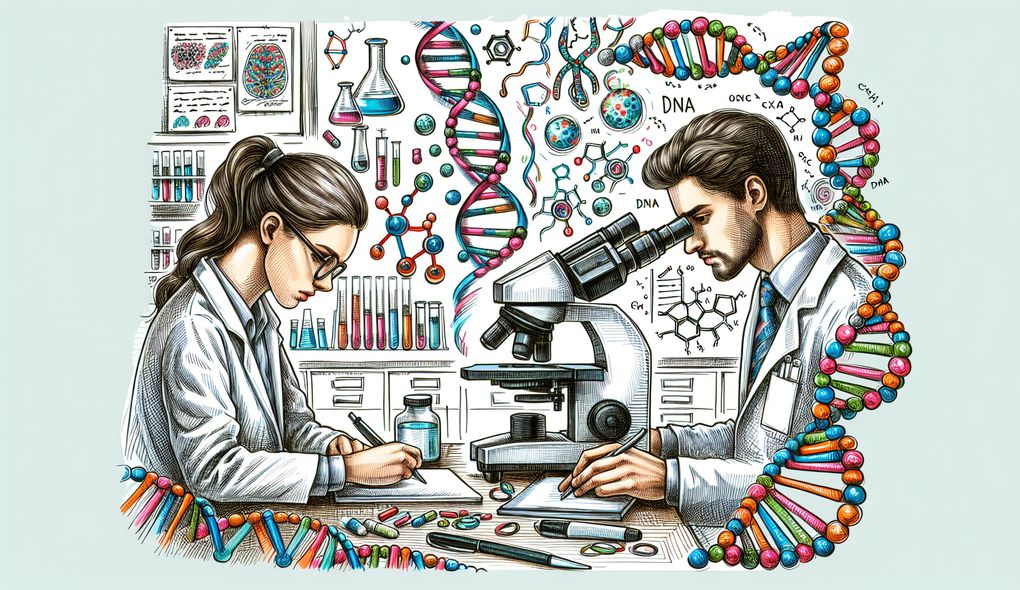Tell me about a time when you had to communicate complex genetic information to a non-technical audience. How did you ensure understanding?
JUNIOR LEVEL

Sample answer to the question:
In my previous role as a Molecular Genetic Researcher, I had the opportunity to communicate complex genetic information to a non-technical audience during a conference. The audience consisted of medical professionals from different specialties who were not familiar with molecular genetics. To ensure understanding, I used clear and concise language to explain the concepts, avoiding technical jargon. I also prepared visual aids, such as diagrams and charts, to support my presentation and make the information more accessible. Furthermore, I encouraged audience participation by incorporating interactive elements, like Q&A sessions and group discussions, to address any confusion or doubts. Overall, by tailoring my communication to the audience's level of understanding and using effective visual aids, I successfully conveyed complex genetic information to a non-technical audience.
Here is a more solid answer:
During my tenure as a Molecular Genetic Pathology Fellow, I had the responsibility of communicating complex genetic information to patients and their families. In one instance, I needed to explain the results of an advanced molecular diagnostic test to a family who had little knowledge of genetics. To ensure understanding, I began by empathizing with their situation and assuring them that I would explain the information in a clear and compassionate manner. I used simple and relatable language, avoiding technical terms, and took the time to answer any questions they had. Recognizing the importance of visual aids, I prepared a visual presentation with diagrams and illustrations that simplified the concepts. I also provided written materials with additional explanations for them to review later. By combining verbal and visual communication, along with a compassionate approach, I successfully facilitated their understanding of the complex genetic information.
Why is this a more solid answer?
The solid answer provides a more detailed example of the candidate's experience in communicating complex genetic information to a non-technical audience. It includes specific actions taken, such as empathizing with the audience, using simple language, and providing visual aids and written materials. The answer demonstrates the candidate's ability to effectively ensure understanding and adapt their communication style to the audience's level of knowledge. However, it could benefit from further elaboration on the use of interactive elements or involvement of other healthcare professionals in the communication process.
An example of a exceptional answer:
As a Molecular Genetic Pathologist, I encountered a challenging situation where I had to communicate complex genetic information to a non-technical audience consisting of a patient, their immediate family, and their primary care physician. To ensure a comprehensive understanding, I employed a multi-faceted approach. First, I conducted a preliminary meeting to assess the audience's knowledge level and address any concerns they had. During the communication session, I used a combination of interactive elements such as visual aids, live demonstrations, and case studies. Integrating these elements allowed for active participation and engagement, enabling the audience to grasp complex concepts more easily. I also collaborated closely with the primary care physician to ensure cohesive and consistent communication. By involving the physician, I aimed to create a supportive network for the patient and their family, fostering a continued understanding of the genetic information throughout their care. Overall, my comprehensive approach to communication enabled me to successfully convey complex genetic information to a non-technical audience while ensuring their understanding and empowering them to make informed decisions.
Why is this an exceptional answer?
The exceptional answer provides a comprehensive example of the candidate's experience in communicating complex genetic information to a non-technical audience. It demonstrates a multi-faceted approach that includes assessing the audience's knowledge level, employing interactive elements, involving other healthcare professionals, such as the primary care physician, and fostering continued understanding throughout the patient's care. The answer showcases the candidate's ability to adapt their communication strategy to the specific audience's needs and collaborate effectively with other professionals. It also highlights the candidate's commitment to empowering the audience and facilitating informed decision-making. The exceptional answer covers all evaluation areas and aligns with the requirements and responsibilities of the Molecular Genetic Pathologist role.
How to prepare for this question:
- Familiarize yourself with the basics of molecular genetics and common genetic disorders to have a solid foundation for communication.
- Practice explaining complex genetic concepts in simple and relatable language. Use analogies or metaphors to make the information more accessible.
- Develop visual aids such as diagrams, charts, and illustrations to support your explanations.
- Consider incorporating interactive elements such as Q&A sessions, case studies, or live demonstrations to engage the audience and address any doubts or concerns.
- Collaborate with other healthcare professionals to ensure cohesive and consistent communication. Familiarize yourself with their role in the patient's care.
- Emphasize empathy and compassion in your communication approach to create a supportive and understanding environment for the audience.
- Seek opportunities to communicate genetic information to non-technical audiences, such as volunteering for community outreach programs or participating in patient education initiatives.
- Reflect on past experiences where you had to communicate complex information to non-technical audiences and identify lessons learned or areas for improvement.
What are interviewers evaluating with this question?
- Analytical Skills
- Verbal Communication Skills
- Teamwork
- Attention to Detail

